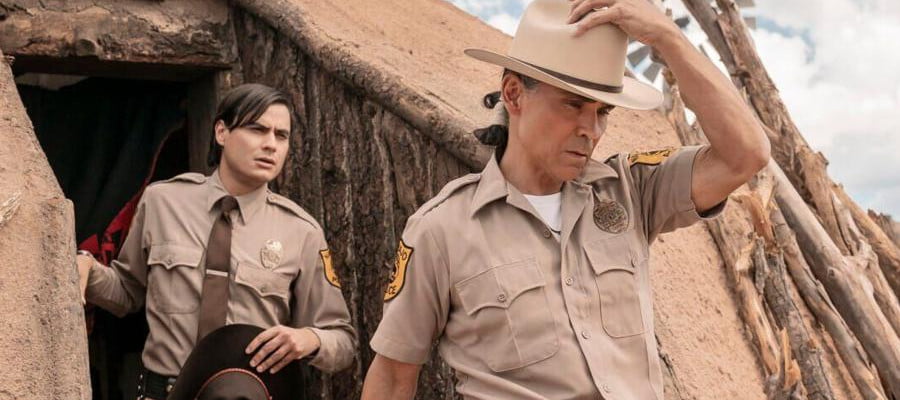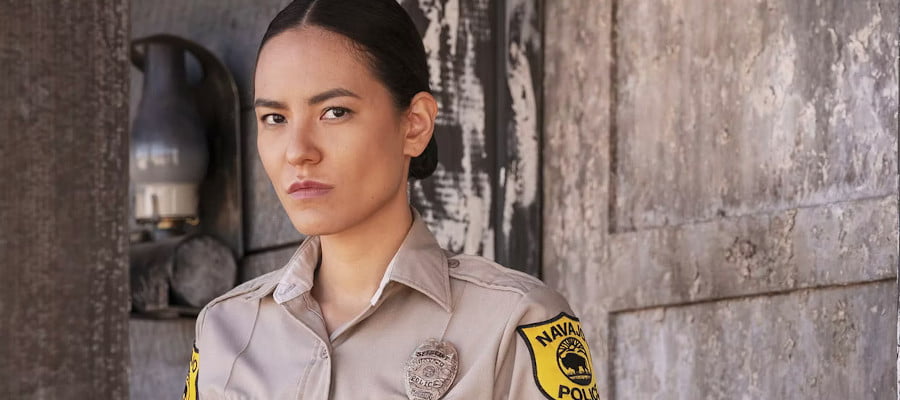I watched all of Longmire. It’s not a good show. Honestly it’s dreadful. It’s basically a cowboy sad dad feels story about a really terrible local sheriff who’s got the low-key racism of ‘well I can’t fix that, but everyone needs to be polite and nice.’ But I watched all of it because it had a fascinating b-plot that showed up from time to time of the Rez, an Indian Reservation that got to exist in a really interesting juridstictional space. And then I watched Fargo, which was a really good show but which mostly held me in the second season with this Native American character. And then I watched Letterkenny and Shoresy which both have elements of Rez politics and I found that interesting and then I found out that there was an actual crime thriller series set on a Reservation and built around that same tension between different police forces and
well
Of course I had to check it out, right?

Content warning: Look, not only am I not a member of the marginalised group this series represents and is about, but I’m also not even from the right country. This is entirely a vision of a cultural space that I have only ever experienced as media, presented to me by American eyes, and therefore, stuff that is acceptable and distributable under the existing power dynamic. You may well just not want to hear a white boy from Australia going ‘wow, I thought this was cool.’
Dark Winds is a 2022 six-episode miniseries? I guess I’d call it a miniseries, but Americans don’t call things miniseries, that’s more of a British thing like The Detections Of Inspector Saddo Meltedface, but really it more feels like AMC aren’t sure if they want to throw a whole series worth of money after a show about a ‘niche interest’ like a modern reimagining of a 1970s series of detective novels about crime on the reservations. That is probably just my basic cynicism about this but I’m not going to complain because it does mean that I got to watch all of this show in one sitting.
Anyway, so uh, the story, the story, hell, it’s about a bank heist? Sort of? But then also it’s about a murder, and the mystery around it, and about a mine failure and about living life on the reservation and what it means to maintain rights to your land and hold on to traditions and culture and sources of power and the kind of pressure wealth can impose on people and it’s really good and I find it really engaging and it’s so pretty.
Wait that last one sounds weird, I guess. But one of the things that the show has going on overwhelmingly is space. Things that happen are all isolated, because the space the story happens in is extremely large, and people don’t tend to just wander by one another. Any time someone is in a space you have to have a reason to go there and see them, and when someone wants to get away they can just run and you have to… like, chase them?
Anyway, I really enjoyed the series and thought about how it was great to see a story of this ilk that isn’t all focused on white people and showed all these interesting ideas and even included characters talking in prolonged conversations in their own language. I liked it! And anyway, time to go check out see what people in the actual affected culture think about it rather than run my mouth about how oh it’s so representative, I feel so connected.

Anyway, Rima Krisst of the Navajo Times wrote (and full article here, so you can check if I’m decontextualising or nothing) that, amongst other things, the Diné language represented in the show is… wrong. Like, wrong in ways that change meanings. Like, wrong in ways that change meanings and change the tone. I don’t have any good examples, but I watch a lot of anime and the number of times I’ve heard a Japanese character say an English phrase that doesn’t mean what they think it does and how often that’s only good for comedy? I tried to imagine what that would be like if I could hear someone say something in a tense or dramatic moment that didn’t work because its English meaning was so obviously inappropriate and anyway, I remembered D_Cide Traumeride, where in the moment of heroic release our protagonists do their transformation sequence by shouting KNOCKER UP.
And that made me shudder to imagine in the tense, thoughtful seeming conversations in Dark Winds.
It’s one of those recurrent threads: It’s not just enough to have marginalised people in front of the camera, they need to have control over them. These aren’t actors who can’t communicate in non-English languages, but the script and plot required them to use Diné, because… that’s the –
that’s the source material?
Hey, what is the source material?

Oh okay, so it turns out that Dark Winds is a story based on a novel series called Leaphorn and Chee by a dude called Tony Hillerman. When he passed his daughter took up the series and wrote more entries in it, that just coincidentally, in those stories, the woman cop in the story kind of stopped being as much of a rescue doll (though, you know), and it’s kind of this pastiche idea that Dark Winds is based on. The three characters weren’t directly involved in the same cases in the books, so it’s a bit more like the books were an inspiration and the basic thrust of the case is the same, but the actual characters doing things are being reimagined for a new now and anyway.
Anyway, yeah, this Tony Hillerman guy was pretty prolific: he wrote eighteen of these Leaphorn and Chee books, and then his daughter added seven more. It’s apparently considered basically the genesis of this whole genre of ‘Native American Detective Novel,’ and… well, yeah, he was a white guy. I’m not saying that to impugn the guy, just in case you were wondering ‘oh is this a novel series by a Native author,’ seems no.
But what stood out to me, what really made me sit up was reading up on Hillerman’s influences. You know, did he have inspiration from a friend in the Reservations, was this a situation where he had a cowriter or something that didn’t get credit, because publishing is like that?
Turns out that he was inspired by a different novel series known as the Bony novels, about a half-indigenous detective named for being found chewing on a biography of Napoleon Bonaparte, written by a guy called Arthur Upfield. Arthur Upfield wasn’t Native American either. Instead, he was much closer to home, an Australian author whose Bony was a ‘half-Aboriginal,’ and… and… yeah those books are racist as hell.
Thing is, I knew about Bony. Know how I knew about Bony?
Because in the 90s, when I was growing up, there was a TV Series about Bony, an updated version that made him into a cool 90s private detective informed by an association with Aboriginal Australians. And yes, he was played by a white guy. It’s a weird little thread to follow, for me, because this history stretches back across a century and includes an actual murder.
We’re still not getting it right. We’re still not doing right.
But good god, we’re doing better than the Bony novels were.